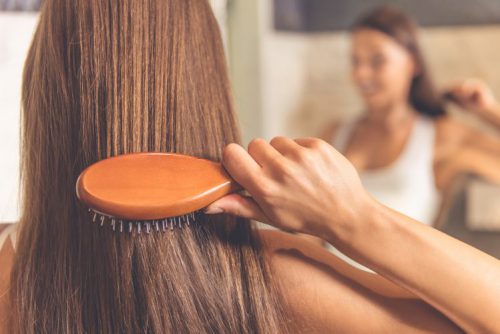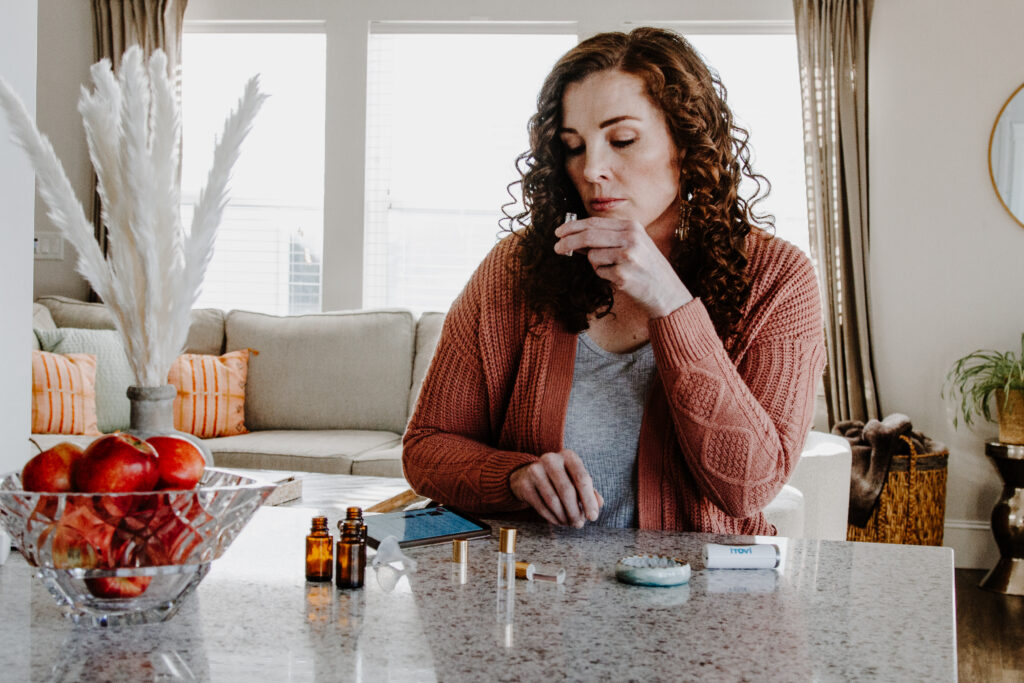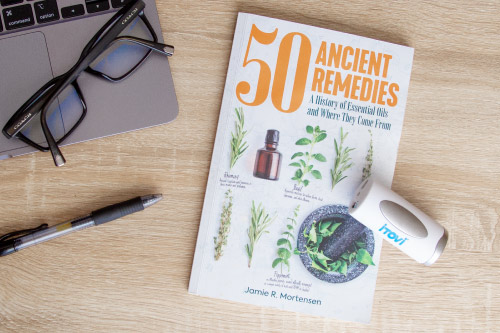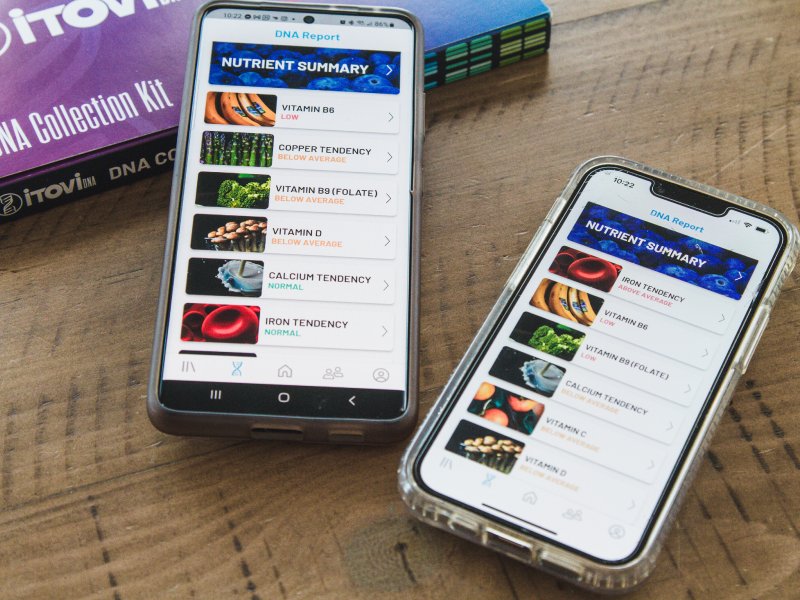
What’s the deal with your endocrine system? Well, picture this: a big, multi-million dollar store chain where the company heads can still send out emails and phone calls…but all of its supply trucks and mid-level managers aren’t available.
Such a company would be doomed to collapse. And that’s basically how your body would be without your endocrine system!
You see, while your nervous system sends lightning-fast, high-level, electrical messages to your organs and tissues—it can’t reach every cell. That’s the endocrine system’s job.
Following the nervous system’s instructions, your endocrine system sends slower-moving, chemical messengers, called hormones, to adjust the activity of your cells to meet your body’s current needs. They are the middle managers that keep your company going!
A good endocrine system carefully balances more than fifty hormones in your body! It constantly works to delicately adjust the balance of hormones in your body to help you use energy, manage weight, respond to stress, regulate your mood, direct your metabolism, manage your blood sugar, and get you through major life transitions (like puberty, pregnancy, and menopause), and more!
The bad news is that an unhealthy endocrine system can throw your bodily processes off! And this can lead to all kinds of health and wellness problems, like hypertension, obesity, poor emotional health, infertility, and more!
We need to take care of our endocrine systems. But how can we do that? And can essential oils help us?
The Two Major Players of the Endocrine System
Most of your endocrine system’s activity comes down to your endocrine glands or your hormone receptors.
Let’s start with the endocrine glands.
An endocrine gland is a little hormone-producing factory. These little factories are spread throughout your body: your adrenal glands sit on top of your kidneys, your pancreas hangs out near your stomach, your thymus sits close to your heart, your thyroid rests at the base of your neck, a couple of specialized glands reside in your reproductive organs, and then there are the pineal and pituitary glands in your brain—the endocrine system really covers its bases!
The pituitary gland in your brain is especially important as it generally monitors the hormone levels in your body and sends instructions to your other glands if adjustments need to be made.
Your hormone receptors are the little mechanisms located either in or on your cells that allow hormones to temporarily change cell activity. You might think of your hormone receptors like little locks and your hormones like little keys that float around in your bloodstream.
When a hormone meets a matching hormone receptor (different cell types carry different receptors), they bind together and trigger a particular reaction in the cell—instructing liver cells to either break down or store body fat, your white blood cells to multiply faster or not, your brain cells to either slow down or increase activity, and much more!
So, in order to have a healthy endocrine system you need 1) healthy, well-functioning endocrine glands and 2) the right number of well-functioning hormone receptors in your body.
How Do I Take Care of My Endocrine System?
Get the Right Kind of Fuel
Your endocrine system keeps your hormones balanced by making small batches of new hormones every day.
And it makes them all from scratch! Well, almost from scratch.
It gets most of what it needs from your daily diet! Unfortunately, that means that an imbalanced diet can throw your endocrine system off!
What can I do? What can my essential oils do?
- Get enough healthy protein. Protein molecules are essential building blocks for hormone building. (Most adults need 50-175 grams of protein a day. Find an ideal balance through your DNA.) Try focusing on lean cuts of meat, fatty fish, and perhaps some plant sources of protein, like pumpkin seeds. Use a nutrition tracker if you want to be precise.
- (Did you know you can flavor meats with essential oils? Find marinade recipes here!)
- Get enough healthy fats. Fats molecules are also needed for hormone production. (Most adults need 44-77 grams of fat a day. Find an ideal balance through your DNA.) Try to avoid large amounts of unhealthy, saturated fat often found in processed foods, while emphasizing healthy fats from avocados, seeds, nuts, and Omega-3s from fatty fish. Use a nutrition tracker if you want to be precise.
- Get enough zinc. Your endocrine system especially needs zinc to build the hormones you need. You only need about 8-11 mg of zinc per day, but try not to miss a day! Good sources of zinc include whole grains, milk products, oysters, red meat, chicken, baked beans, chickpeas, and nuts.
- Avoid excess sugar and high-glycemic-index foods. Large amounts of sugar (like in sodas, fruit juices, and desserts) and high-glycemic-index foods (like white bread, chips, and fast foods) spike your blood sugar, which taxes your endocrine system as it has to work extra hard to keep your body balanced. Try to moderate these foods and replace them with complex carb sources (vegetables and whole grains) wherever possible.
(Bonus: Complex carbs and probiotics will help your endocrine system produce the right amount of serotonin—the “happy” hormone!)
- Look out for endocrine disruptors. Processed foods and chemical house products can sometimes carry endocrine disruptors—substances that can interfere with the natural functioning of your hormones. For maximum endocrine health, try to eat unprocessed, organic food whenever you can and use natural cleaning products.
Be Strict About Your Sleep
Sleep is a hormonal affair. And it can drastically affect the health of your endocrine system.
Regular, adequate, high-quality sleep helps your endocrine system 1) be regular and healthy with its production of melatonin, the “sleep” hormone and 2) maintain a healthy relationship with the hormone insulin, protecting you from type 2 diabetes and boosting your energy levels!
What can I do? What can my essential oils do?
- Plan for 7-8 hours of sleep. There’s no getting around it—your body needs 7-8 hours of sleep to stay balanced. If you feel robbed of the time, just remember that the right quantity of sleep enables you to get the highest quality (energy, focus, health, etc) in your waking hours. Try not to sleep in either, as too much sleep can throw off your sleep cycles too. (Bonus: Between 10-11 p.m. is the heart-healthiest time to go to bed.)
- Have a regular bedtime routine. Dedicating just an hour or 30 minutes to a daily, pre-bedtime routine can be an absolute game changer for your sleep quality! In the hour before bed, avoid excess light, including light from screens as much as possible, complete your nighttime hygiene habits, savor some sensory cues (lavender is the best-researched oil for sleep support), and maybe do some light reading or journaling.
- Optimize your sleeping space. Because sleep is so vital, it is worth it to invest in your sleeping space. Comfortable bedding and pajamas, 60-67 degree room temperature, blackout curtains, and perhaps a white noise machine are a good place to start.
- Have a regular morning routine. The better you are about getting up on time, the easier it will be to go to bed on time. Consider using your invigorating oils (citruses are morning-routine favorites), along with a glass of water and a little movement, to help you get your morning energy up!
Manage Your Stress
Whenever your body picks up on some kind of problem, threat, or challenge—it calls upon your endocrine system to produce stress hormones to help the body divert its energy from less-urgent processes (like digestion or reproduction) towards your best emergency-response organs/parts, like the brain, heart, and muscles.
However, after the difficulty has passed, your endocrine system may need a little help turning off the stress hormones so you can return to a healthy, energy-restoring balance.
Good stress management habits can help us redirect the endocrine system’s activity, so stress hormones only stick around only long enough to help us rather than hurt us.
What can I do? What can my essential oils do?
- “Check in” with yourself regularly. We cannot manage what we are not aware of. Make time to regularly stop what you’re doing and look inwards, gauge your energy level, your ability to focus, and whether your body could use some water, a short walk, or some other support. Get even better results using a “stress journal, a stress-tracking app or watch, and/or regular iTOVi Scans!
- Find and practice YOUR best stress-relief methods. Explore different habits to find what restores YOUR energy and equilibrium most efficiently in different situations—be it a few minutes of meditation, a short nap or walk, some creative work, a call to a family member or friend, etc. Use iTOVi Scans to find your best oils to combine with your best stress-relieving tactics.
- Breathe in and/or topically apply essential oils. Many essential oils have shown stress-relieving actions in human studies. Oils specifically studied for their effects on stress hormone levels in humans, especially cortisol, include lavender, rosemary, orange, sandalwood, rose, clary sage, and peppermint.
- (Bonus: Many oils may additionally reduce stress by combating inflammation and providing antioxidants to the body.)
- Do the wellness basics. Nothing helps your body resist and recover from stress like regular sleep, a good diet, exercise, adequate social interaction, etc. Guard these habits well and stress management will be much easier!
Tailor your Exercise
Your exercise habits can make or break the health of your endocrine system.
Too little exercise can reduce your body’s ability to use the insulin hormone (by reducing the number of insulin receptors in your cells)—sabotaging your power and energy levels and possibly setting you up for type 2 diabetes!
On the other hand, too much exercise can heighten your stress hormone levels, make you gain rather than lose fat, and cause other hormone imbalances that can ruin your mood, energy levels, and even mess with your fertility!
For the health of our endocrine systems, we need to make like Goldilocks and find just the right balance of physical activity that will help us balance our hormones and give us those sweet benefits of mood, energy, and longevity.
What can I do? What can my essential oils do?
- Plan for a balance between cardio & strength training: Cardio training, when done right, can strengthen your heart and help balance your cortisol. Strength training, when done right, helps produce growth hormones that keep our body tissues healthy. And, as you might have guessed, a smaller amount of both types of training, cardio and strength, is better than a lot of one type.
- Be regular, but don’t overdo it. Look out for changes to your mood, energy levels, ability to sleep, menstrual cycle, or injury indicating that you are working out too hard/too much.
- Recommended Cardio Training:
- High-intensity (heart rate over 90% of max): Do two 30 to 45-minute sessions a week
- OR (don’t do both)
- Moderate-intensity (heart rate between 64-76% of max): Do three 50-minute sessions a week
- High-intensity (heart rate over 90% of max): Do two 30 to 45-minute sessions a week
- Recommended Cardio Training:
-
- Recommended Strength Training:
- Start where you are at. However many reps you do in a session, the last 2-3 should be difficult, but still doable and can be done with good form.
- Beginners: 2-3 sessions per week, full body (squats, lunges, rowing, etc)
- Intermediate: 3-4 sessions per week, split up by body part or upper-lower
- Advanced: 4-5 sessions per week, split up by body part or upper-lower
- Recommended Strength Training:
(Need motivation? Try using peppermint and citrus oils to help energize you to get started.)
- Always have a rest day/days: Your body needs time to put all your good work to use! In a way, your training time is how you prepare your body to improve and your rest time is when that improvement actually happens. So don’t neglect your rest! Feel free to rub down your muscles with diluted anti-inflammatory oils like wintergreen, frankincense, and peppermint!
- Supply your body for recovery: Nutrition is absolutely vital for exercise success. Keep your body hydrated and well-supplied with the macronutrients and micronutrients it needs to fuel your exercise and recovery. Use a nutrition tracker or meal plans if it helps.
- Improve your body’s relationship with insulin. Many Americans struggle with insulin resistance—which is what happens when your cells aren’t using the insulin hormone and therefore the sugar in your blood very effectively. Regular, healthy amounts of exercise can help gradually reverse insulin resistance. So keep at it! Limited research suggests that perhaps keto-dieting, intermittent fasting, coriander, and cinnamon oils might be able to help as well.
A Useful Note About the Endocrine System & Emotional Wellness
Our emotions are not pure products of our hormones. They are influenced by many bodily factors, social factors, our personal history, and more. However, the endocrine system does give us a very interesting insight into how our emotions work:
When you come across an emotional situation, especially an urgent one, your nervous system acts first. Whether the emotional stimulus and situation are positive or negative, it only takes milliseconds for your nervous system to initiate a knee-jerk response! You might shout (either in joy, fear, or anger), flinch away, smile, freeze, lash out, verbally apologize and submit, or give whatever response your brain has been trained to give in such a situation.
And sometimes we may be tempted to think that, if our nervous system response was good, we have successfully navigated that emotional situation! And that we are done with it.
However, sometime later (maybe a few seconds later or a few minutes) the endocrine system’s response kicks in. And we feel our emotions in a whole new way, in our bodies and not just in our minds. And sometimes this is when our truer, deeper feelings come out.
In the rush of the moment, you may have said or done something that goes against your deeper feelings. You may have shouted at someone who didn’t deserve it. You might, out of habit, said “I’m fine”—only to realize a few minutes later that you’re actually not fine. Perhaps you froze for a moment and later realized that you should have done something.
Be aware of this. Pay attention to both sides of your emotional response. And consider both when you are doing emotional-processing work. Your feelings on something can still be valid even if you took a little while to be able to feel them.
| Class Ideas: |
|




